#that happened in one of my other answers when i said 'laius' but it sounded like 'naous' ?? 2x
Explore tagged Tumblr posts
Note
FALENNN ur voice is so nice to listen to omg... i hope this isn't weird but i would listen to you if u had a podcast omfgg like the way you talk is like... hey girl heyyyy JKSDHKJFHS anyways. 23. I’ll talk about the music I’m listening to at the moment for the ask meme lol!!
AAHHHH MISS YUUUUU!!!! omfg that’s SO SWEET OF YOU TO SAY im so touched omfg... i used to really dislike my voice but over time i started to like it ? be okay with it ? a bit more and omg that really makes me so happy to hear you say that AAA my heart is yours!!! (pretend there are multiple heart emojis bc im on desktop gfdgf)
23. ill talk about the music i’m listening to at the moment
(here’s the list of songs i mentioned if you’d like to give them a listen!! ^__^)
#another eight minute recording <3#ALSO THERES A PART IN THE MIDDLE WHERE IT SOUNDS LIKE I SAID hrny AND I#SAID FUNNY!!! BUT IDK WHY IT SOUNDED LIKE THAT!!! gfdgdfgfd#that happened in one of my other answers when i said 'laius' but it sounded like 'naous' ?? 2x#gfsdgfdgdfs#so sowwy about that idk how that happened wtf gfdgfdg#BUT YES THANK YOU#s#nezh4a#lovemail
1 note
·
View note
Text
The literary sources of BTS’ “Singularity” (Part II)
Chapter II: Oedipus Rex, the blind who had eyes
* This is a personal and purely philological analysis, that is, centred on the study of literature and/or the language as used in literature.
* This post was originally written in Spanish and translated into English, sorry if there are any errors.
* You can check part I --Narcissus and the problem of self-identity--, here.
* Also, you can check my in-depth analysis of Singularity lyrics here.

As we established in the first part of the analysis, one of the main literary sources of "Singularity" is the classic myth of Narcissus, established in Western culture through the Metamorphosis by Ovid. Remember that Narcissus, the son of a nymph and a god, ends up so enamoured with his reflection that he ends up falling into the water where his beautiful face appears, dying because of his own vanity. We affirmed that in one of the versions of the myth, the mother of Narcissus, the nymph Liriope, decides to visit Tiresias (in ancient Greek, Τειρεσίας), one of the most famous soothsayers of Greek mythology. This character, present as a prophet in all Greek tragedies related to the founding of the city of Thebes --one of the most important social nuclei of ancient Greece-- is not only considered the mediator between gods and humans but between men and women --by its androgynous nature. and between life and death.
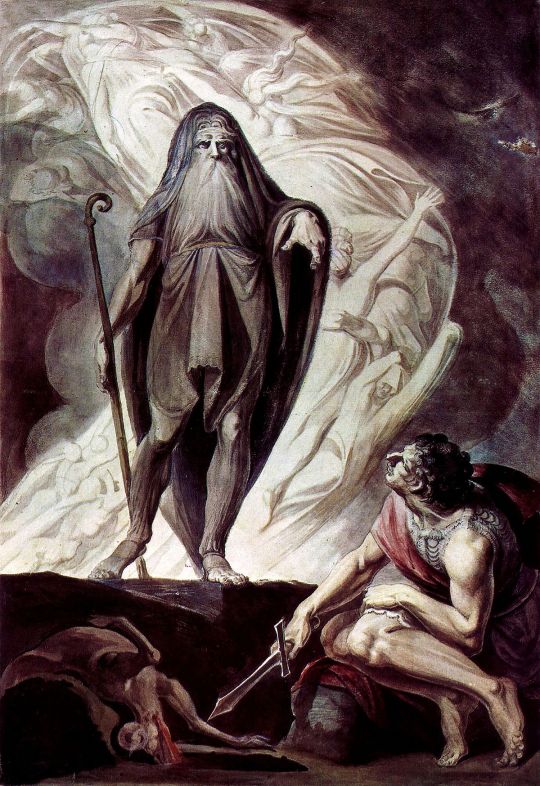
[Tiresias appears in front of Odysseus during the sacrifice, Heinrich Füssli (1780-85)]
One of the main tragedies, and the one that will centre this second part, is Oedipus Rex (Oι̉δίπoυς τύραννoς), a Greek tragedy written by Sophocles in an unknown date (it is believed that it was composed around 430 BC). Broadly speaking, the work begins during the mandate of Oedipus, king of Thebes and husband of Jocasta. His glorious reign is dying by an aggressive epidemic of plague and he orders his brother-in-law Creon to depart for the Oracle of Delphi (a sacred temple dedicated to Apollo, built in the Villa of Delphi, Greece).
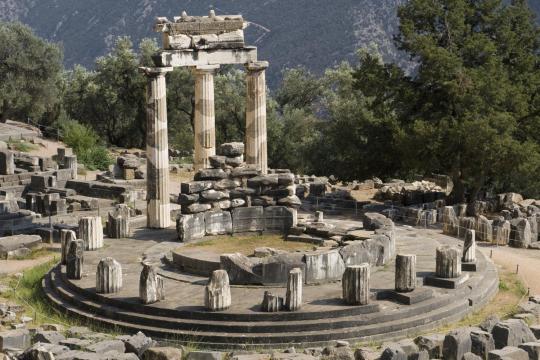
The prediction is clear: the plague is a divine punishment because the death of Laius, the previous king, has not been avenged and it will not disappear until the guilty party is killed or sent into exile. After this, Oedipus collaborates arduously to discover the culprit -- to who promises to save his life and only punish him/her with exile--, relying on his citizens and the close members of his family. It is precisely Creon who introduces the character of Tiresias since he advises the monarch to come to him to solve the problem.
OEDIPUS: Teiresias, you who understand all things—what can be taught and what cannot be spoken of, what goes on in heaven and here on the earth—you know, although you cannot see, how sick our state is. And so we find in you alone, great seer, our shield and saviour.
We must bear in mind that Tiresias, who appears in this work as a character already known from other mythological cycles --Greek tragedies were represented in the amphitheatres and used to use dynasties of characters that all the public knew-- is a blind fortune-teller. When he arrives in Thebes, he refuses to declare what he knows, even though he was present at the time of Laius' murder, and he and Oedipus confront each other in a heated conversation. Irritated, Tiresias declares that Oedipus is the murderer that Oedipus himself is searching for and insinuates him that he lives in incest with his mother, with whom he has had children, he is not the Theban as he believes and that, shortly, he will be blind like him. Faced with such accusations, Oedipus does not believe him and thinks that the fortune-teller has conspired with Creon to snatch his throne.
TEIRESIAS: I say that with your dearest family, unknown to you, you are living in disgrace. You have no idea how bad things are.
OEDIPUS: Do you really think you can just speak out, say things like this, and still remain unpunished?
TEIRESIAS: Yes, I can, if the truth has any strength.
OEDIPUS: It does, but not for you. Truth is not in you— for your ears, your mind, your eyes are blind!
TEIRESIAS: You are a wretched fool to use harsh words which all men soon enough will use to curse you.
TEIRESIAS: You may be king, but I have the right to answer you—and I control that right, for I am not your slave. I serve Apollo, and thus will never stand with Creon, signed up as his man. So I say this to you, since you have chosen to insult my blindness— you have your eyesight, and you do not see.

Since the tragedy is extensive, I will try to explain the argument briefly. Finally, Oedipus, who was actually the heir of the kings of Corinth, left his city because of an oracle that proclaimed that he would kill his father and marry his mother. He wanted to avoid the tragedy of his destiny and fled. During the way, he's entangled in a brawl in which he assassinates several people ..., one of them turns out to be Laius. With the intervention of several witnesses, it is known that Oedipus was not the biological son of the kings of Corinth since he had been abandoned on a mountain shortly after being born and saved by a messenger from the kingdom of Corinth. Little by little, Jocasta, his wife, realizes the truth: Oedipus is the son that she and Laius abandoned to their fate so that a fateful oracle would not be fulfilled, unaware that the messenger had managed to save him. Oedipus, oblivious to his true identity, had become a brave citizen of Thebes and, after overcoming the enigma of the Sphinx, took the throne. Married to his mother and having killed his real father, Oedipus stabs his eyes, not wanting to see the tragedy of his existence, and asks for an exile with his two daughters, which marks the end of the story.
OEDIPUS: But the hand which stabbed out my eyes was mine alone. In my wretched life, why should I have eyes when nothing I could see would bring me joy?
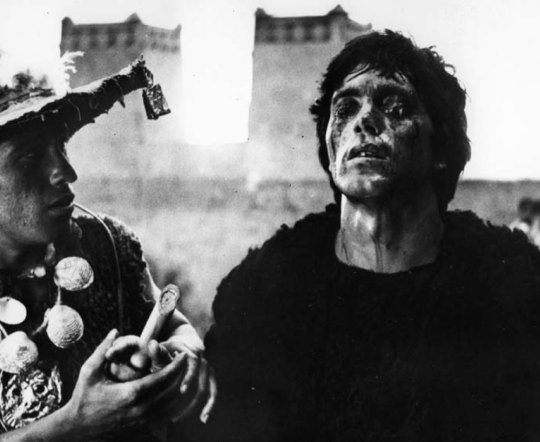
[Oedipus Rex, film adaptation by Pier Paolo Passolini (1967)]
In summary, we can see that Tiresias is the only one, by being ironically blind, who can see the truth in a world full of people who have eyes but cannot see. He's the famous prophet whose true revelation is not accepted when he twice proclaims it. The originality of Sophocles lies in this irony (especially taking into account that Tiresias appears at the beginning of the tragedy), in the belief that the knowledge of the human being is not a simple objective fact that is imposed on us, but a subjective possession before the one we can react belligerently, as a possession that partly needs to be possessed by the one who receives it to become effective. That is why Oedipus rebels against the truth, because he believes more in him than in the gods.

A fatal love, the intervention of a vengeful divinity or the problematization of sight are common themes between the myth of Narcissus, Oedipus Rex and Singularity. If we stop a bit in the lyrics, we can extract some examples:
A sound of something breaking I awake from sleep
We have the fracture, the rupture of the individual once he realizes he's wearing a mask, he's blind.
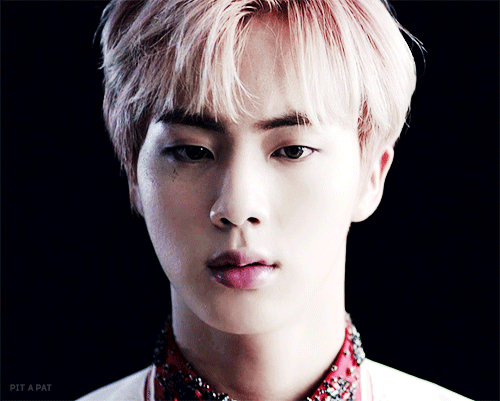
I dumped myself into the lake I buried my voice for you Over the winter lake I was thrown
The lake, an obvious reference to Narcissus and his death. On the other hand, the second verse talks about a certain culprit (that’s why he says 'for you’ or uses passive verbs that exempt him from responsibility: 'I was thrown’), like if he was even talking to a god, maybe to a woman (that's the simplest interpretation). However, he's talking to himself. He's the culprit of his blindness like Oedipus is.

In addition, another interesting aspect is the last speech of the tragedy. This is said by the chorus, a collective character who comments and judges what happens in the tragedy and represents the Theban citizen, the public. I could not help thinking about the dancers of the video.
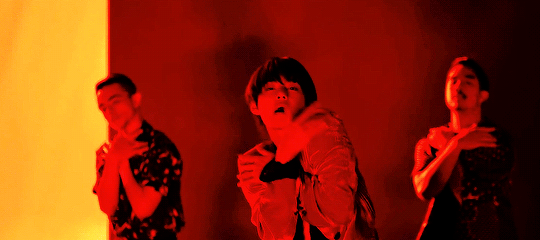
CHORUS: You residents of Thebes, our native land, look on this man, this Oedipus, the one who understood that celebrated riddle. He was the most powerful of men. All citizens who witnessed this man’s wealth were envious. Now what a surging tide of terrible disaster sweeps around him. So while we wait to see that final day, we cannot call a mortal being happy before he’s passed beyond life free from pain.
Also, BTS tends to distort the figure of the idol, that is, the famous singer who is seen as a deity and not as a human being. Oedipus, like Taehyung, is seen by the public as a king, as a divine emissary, but eventually ends up being as mundane as the spectators. He suffers, he has doubts and, sometimes, he doesn't love himself either.
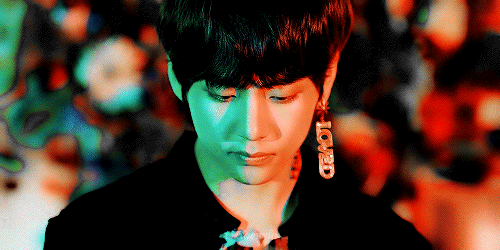
Lastly (I KNOW THAT I AM WRITING A LOT), among the main themes of this fabulous work of universal literature, we must talk about the problem of the search for truth and the risks and harms involved in achieving knowledge. Nietzsche speaks of this drama in the 9th chapter of the Birth of Tragedy (1871-1872). The main thesis of this book states that art is based on two fundamental notions that the Greeks of the archaic era and the classical era, ie, the Greeks prior to Socrates, knew: the two fundamental impulses of nature that are symbolized by two Greek gods, Dionysus and Apollo.
Apollo and Dionysus symbolize two physiological states of the human being: sleepiness and drunkenness; as well as two vital impulses: the individuation (JUNG'S INDIVIDUATION PROCESS!!!!!) and the overflow. Broadly speaking, Nietzsche makes use of the deities to highlight the human condition in its strictest sense and, in turn, unveil the struggle or opposition of forces that hide in the bosom of nature. Apollo symbolizes the veil (the beautiful forms/artistic creations that adorn life and justify it) and Dionysus symbolizes suffering, death, truth..., the tragic wisdom, that is, the terrible awareness of the finitude of Men and his suffering existence. Nietzsche states that the hypertrophy of some of the elements could be harmful to man, an excess of veil could lead to optimism and rationalism, and an excess of truth could lead to suicide or asceticism. Both elements are necessary so that life can be kept in balance.
To end, Nietzsche presents Oedipus as a transgressor, a hero condemned to fall for having tried to go too far. By transgressing nature and social norms, and wanting to find out what is forbidden, Oedipus discovers a world whose vision is forbidden to the rest of mortals. He commits a masculine, heroic version of original sin by choosing to eat from the tree of knowledge that condemns humanity to abandon innocence. In this case, it is his curiosity and his integrity that encourages him to investigate. That abandonment of innocence, of comfortable ignorance, is the cruel and heroic destiny of Oedipus, and his deed consists in his sacrifice (LIKE IT HAPPENS IN 'DEMIAN'!!!). Searching in ourselves, inquiring into our motives and wounds, has a price, it leads to a rupture of the individual necessary for the rebirth of the being.
Thus the man who is responsive to artistic stimuli reacts to the reality of dreams as does the philosopher to the reality of existence; he observes closely, and he enjoys his observation: for it is out of these images that he interprets life, out of these processes that he trains himself for life. It is not only pleasant and agreeable images that he experiences with such universal understanding: the serious, the gloomy, the sad and the profound, the sudden restraints, the mockeries of chance, fearful expectations, in short the whole 'divine comedy' of life, the Inferno included, passes before him, not only as a shadow-play — for he too lives and suffers through these scenes — and yet also not without that fleeting sense of illusion; and perhaps many, like myself, can remember calling out to themselves in encouragement, amid the perils and terrors of the dream, and with success: 'It is a dream! I want to dream on!' Just as I have often been told of people who have been able to continue one and the same dream over three and more successive nights: facts which clearly show that our innermost being, our common foundation, experiences dreams with profound pleasure and joyful necessity (Nietzsche, The Birth of the Tragedy).
I hope you liked this and found it interesting and easy to read. I’m working in the next chapters, which will talk, among many things, about these works/characters/topics:
Frankenstein (Mary Shelley, 1818): A man can create his own monster
Wuthering Heights (Emily Brönte, 1847): Narcissus and Heathcliff
Jane Eyre (Charlotte Brönte, 1847): Understanding the Double - Jane Eyre and Bertha Mason
Alice Through the Looking-Glass (Lewis Carroll, 1871): The mirror symbolism
Strange Case of Dr. Jekyll and Mr. Hyde (Robert Louis Stevenson, 1886): Evil in a reflected identity
The Picture of Dorian Gray (Oscar Wilde, 1890): Self-image and ego
Dracula (Bram Stocker, 1897): Innate evil without a reflection
Peter Pan (James Matthew Barrie, 1904): Seeking for a reflection in the absence of shadows
Ophelia (from Hamlet, by William Shakespeare, 1603): Madness, water and suicide
From the myth to contemporaneity: how to codify identity and body in the information age
#365booksfornamjoon#rmbooks#rm books#namjoon reading#namjoon books#namjoon reading list#kim daily#bts theory#bts analysis#bts lyrics#singularity#singularity explained#bts singularity#oedipus rex#sophocles
36 notes
·
View notes